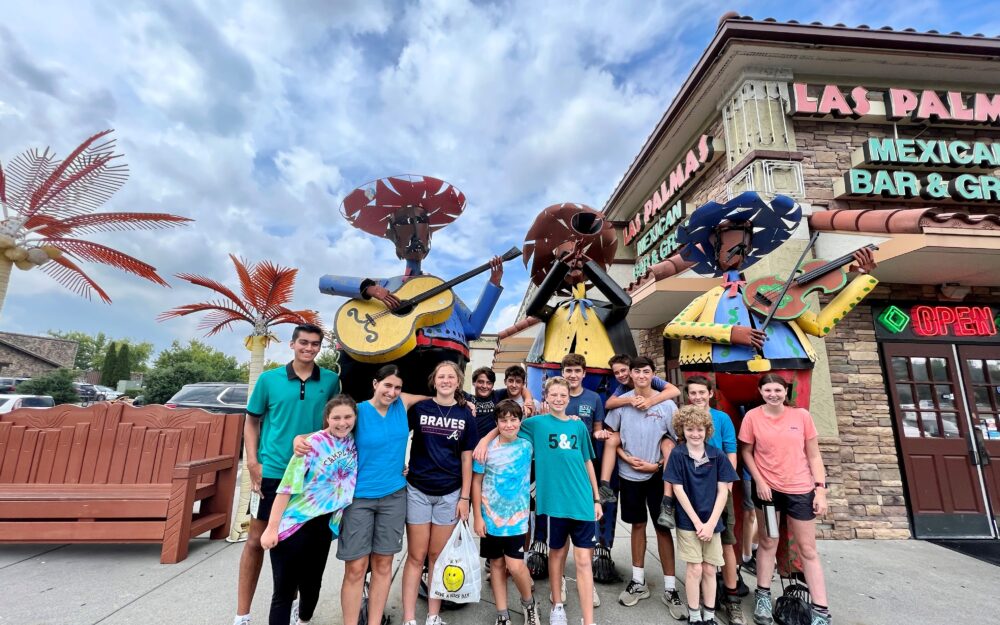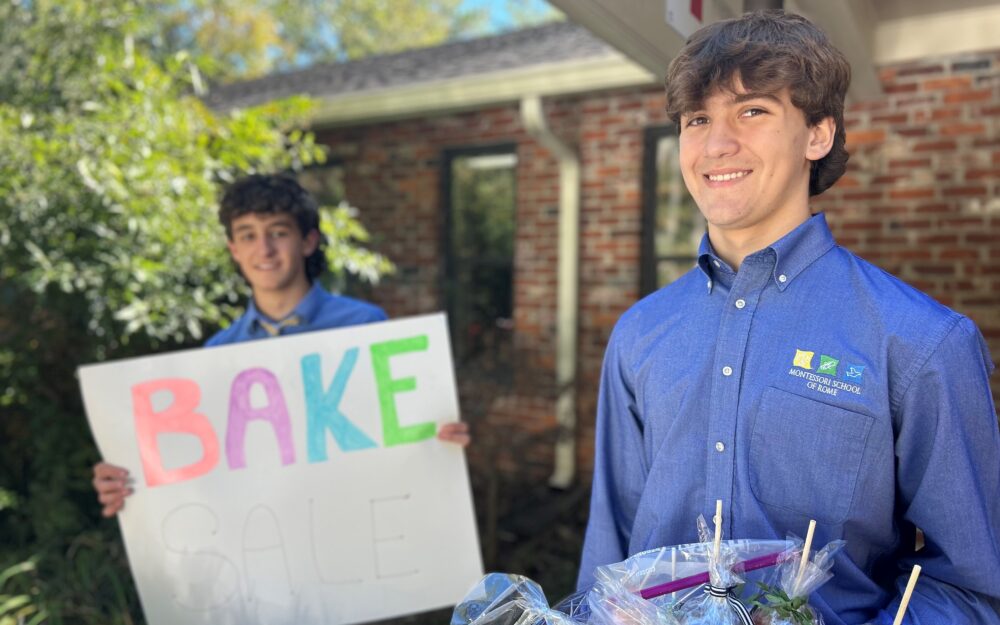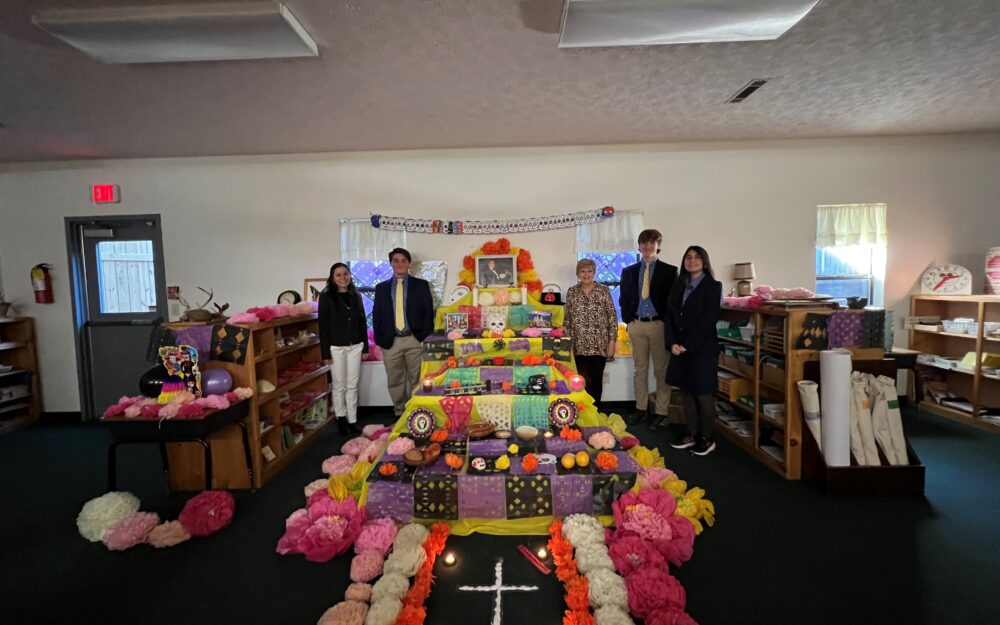Secondary
“The need that is so keenly felt for a reform of secondary schools is not only an educational but also a human and social problem. This can be summed up in one sentence: Schools as they are today are adapted neither to the needs of adolescence nor to the time in which we live.” — Dr. Maria Montessori
The Montessori School of Rome provides a Secondary program carefully aligned with the vision of Dr. Maria Montessori. As Voltaire wrote, “with great power comes great responsibility,” and we want our students to carefully consider the duties of a Secondary student before committing to this program. We promise to provide our students with a meaningful Secondary curriculum.
WHAT IS THE SECONDARY PROGRAM?
By invitation only and available only to select current students, students in 10th through 12th attend classes taught by qualified adjunct instructors. Our Montessori Secondary program includes thematic instruction; discovery-based learning; individual and small-group learning projects; authentic and performance-based assessment; small advisory groups; community service, internships, and Dual Enrollment.
What makes a great MSR Secondary student?
Someone who is a self-directed, active learner, and curious about our world. We want students who do not simply listen to lectures and repeat the information. Students should be engaged in creative thinking and problem solving. We see ourselves as engaged facilitators in their learning process. In exchange for the promises we make to them, we invite a reciprocal agreement from the students. They are given responsibility and respect.
What subjects are included in the curriculum?
Our academic program focuses on the humanities: literature, language, critical thinking, creative writing, American and world history, cultural studies, geography, and current events. We offer a complete math curriculum of Geometry, Algebra II, and Pre-Calculus. Science studies cover Life Sciences, Earth Sciences and Physical Sciences, covering Biology, Chemistry, Physics, and Astronomy. We offer Southern Literature, American Literature, and British Literature. We offer a Junior Entrepreneurship class with focus on Finance and Accounting. We also incorporate Spanish, physical fitness, music, art, and research skills. Our adjunct instructors include Shemi Kumar, Science, Chandler Lawrence, Communications, Patti Maffett, Mathematics, Melanie Montanaro, Literature, Justin Pollard, History, Carolina Wright, Spanish, and Caleb Westergreen, Science.
What makes us different from a traditional high school?
An important focus of the program is finance and entrepreneurship. Students are responsible for developing a business to raise funds for a major trip each year, and to give back to the school community. This year, the students run “The Lunch Box” business, “Breakfast Box”, MSR Summer Camp, and host several events throughout the year. The students offer clubs such as Sports Club, Improvisation Club, and Cyber Club. They are in charge of marketing, implementation, delivery, and financial statements.
Do you offer AP courses?
We offer AP courses on a rotating schedule. We offer AP Human Geography, Psychology, World History, U.S. History, U.S. Government, Language and Composition, Calculus AB, Statistics,Biology, Environmental Science, Macroeconomics, and Microeconomics.
DO YOU OFFER A WAY TO RECEIVE COLLEGE CREDITS?
We offer a Dual Enrollment program with several of the colleges in the area. We currently have students taking classes at Georgia Northwestern, Georgia Highlands, and Kennesaw University. Our students average 3 college classes per semester in the Dual Enrollment program. Students have the opportunity to graduate from the Secondary program with two years of college credits completed.
What about travel?
Students run businesses to raise money for domestic and international travels. Internationally, they have been to Cuba, Mexico, Italy, and France. Domestic travels include Los Angeles, Santa Monica, the Grand Canyon, Williamsburg, and Washington, D.C.
They are responsible for managing the finances for their travel fund and all funds for these trips are earned by the students, and they are active participants in the travel itinerary and plans. These kinds of “Practical Life” activities are essential. They provide direct learning experiences that involve the secondary student with meaningful learning activities
Is it difficult to contact your child’s teacher?
We are a small community, and we get to know your children very well. We offer parent/teacher/student conferences three times a year where we all sit down and discuss your child’s progress. These conferences last anywhere from one to two hours depending on your student’s needs. Your child receives an exceptional level of personal attention to ensure your child’s academic success. Our teachers are available daily by email, phone, and personal contact.
Do you offer Physical Education?
Our students take private tennis lessons weekly, and they participate in local soccer, baseball, fencing, and dance activities. The students work with a personal trainer each week.
What are the school’s expectations?
We expect our students to:
- Contribute in a meaningful way to experience the responsibilities and leadership possibilities within my class.
- Utilize critical thought and abstract thinking to create interdisciplinary project-based approaches to learning.
- Develop a personal connection to the subjects offered.
- Accept the limitations of others and work with classmates to the best of their ability to create a sense of belonging and acceptance.
- Take responsibility for creating a space where people feel welcomed and valued.
- Respect and honor each student’s differences, complexities, and gifts, creating an atmosphere for personal growth without ridicule.
- Participate in seminars, group learning, and hands-on activities.
- Demonstrate mastery of material in the Adolescent curriculum by properly preparing for each class and taking seriously the assessments, whether they be quizzes, tests, book reports, oral presentations, group work, visual projects, demonstrations, and science labs.
- Participate in the performing arts to enhance the community
- Maintain the environment both inside and outside the classroom.



